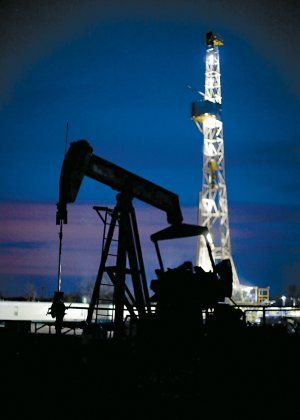
The ongoing debacle in the Gulf of Mexico is a sign of many things—the incompetence of BP, poor oversight, and an industry that places too much emphasis on production technology and too little on safety technology. But it also highlights a larger truth. We've entered an age in North America where the production of energy, especially from fossil fuels, comes with ever-more-expensive environmental tradeoffs. We've entered what Michael Klare, a professor at Hampshire College, calls the era of "extreme energy."
Consider how oil production in the U.S. has evolved. In Texas in 1901, wildcatters didn't have to work very hard to tap into the great Beaumont gusher. The oil was essentially at the surface, all but seeping out of the earth's crust. When the land-based oil was exhausted, American prospectors went to sea. And when the shallow-water oil was exhausted, they went farther out. In 1985 only 21 million barrels, or 6 percent of the oil produced in the Gulf of Mexico, came from wells drilled in water more than 1,000 feet deep. In 2009 such wells produced 456 million barrels, or 80 percent of total gulf production. Today, deepwater gulf wells account for about one quarter of the oil the U.S. sucks from the earth. The Webcams broadcasting images from the spill provide a real-time measure of the environmental cost of this effort.
The Gulf of Mexico isn't the only place where such so-called tough oil is to be found in North America. The environmental hazards of drilling in the Arctic National Wildlife Refuge are so obvious that even the Bush-era Congress and White House wouldn't go there. Analysts have enthused about the rapid development of the Alberta tar sands in Canada—friendly, nearby, democratic, non-terrorist-promoting Canada. An Alberta government Web site notes that the oil sands are "the second largest source of oil in the world after Saudi Arabia." The reserves there—171.8 billion barrels—amount to 13 percent of the global total and are about what Iraq and Russia have, combined. But the gunk in the tar sands isn't really oil. It's bitumen. And it has to be ripped out of the earth, or pushed to the surface in a process that itself consumes a lot of water and natural gas. Producing a barrel of oil from tar sands creates more than twice the amount of emissions of old-school oil drilling.

Natural gas is supposed to be an easy form of energy—it burns more cleanly than petroleum, and the U.S. has vast supplies. In recent years discoveries of reserves locked in shale rock in the Ozarks (the Barnett Shale) and in the Appalachians (the Marcellus Shale) have spurred a boom. But shale gas is also tough energy. The gas is produced via fracking—fracturing the rock with water and chemical solvents to loosen up the gas molecules. The environmental risk? The water mixed with solvents could filter into underground aquifers. Inconveniently, the Marcellus Shale overlaps with the watershed of the New York City region. And then there's the matter of earthquakes. Last year experts in Texas grew concerned when rare seismic activity was detected in areas where natural-gas drillers had been fracking.
Even the cleanest sources come with tradeoffs. The wind-turbine farm off Cape Cod, Mass., aroused the ire of waterfront homeowners whose views would be marred by giant propellers in the distance, but also by environmentalists concerned about its potential impact on wildlife. Proposals to put huge solar arrays in the Mojave Desert have provoked similar green concerns.
Thus far, we've deemed these risks—oil spills, more emissions, polluted water, the odd earthquake—to be worthwhile, in large measure because of the laws ofsupply and demand."As the price of energy keeps drifting higher, we're going to do more and more dubious things," says Joseph Romm, an assistant energy secretary in the Clinton administration and editor of the influential Climate Progress blog.
But the response to the age of tough oil shouldn't be engineering feats that allow us to drill deeper or to liberate hydrocarbons from rocks. Rather, we should apply our collective engineering smarts to figuring out ways to use less energy. If we want to avoid extreme energy, we need extreme efficiency.
Uncommon Knowledge
Newsweek is committed to challenging conventional wisdom and finding connections in the search for common ground.
Newsweek is committed to challenging conventional wisdom and finding connections in the search for common ground.
About the writer
To read how Newsweek uses AI as a newsroom tool, Click here.








